Home Remedies For Dark Circles: 13 Natural Solutions
Banish dark circles with soothing and reinvigorating natural ingredients.
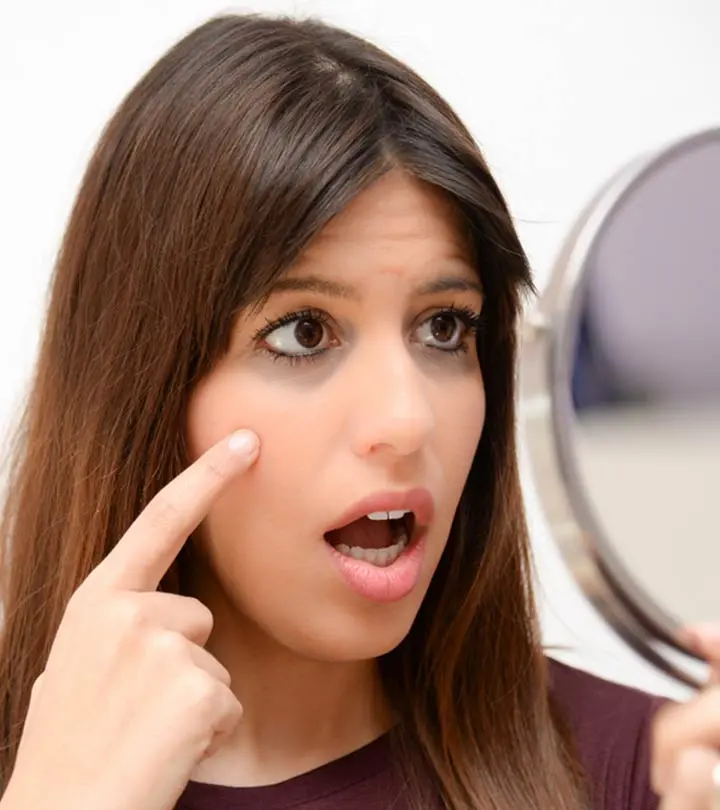
Image: ShutterStock
Dark circles can be frustrating. But don’t worry! We have safe and gentle solutions for you – home remedies for dark circles. These remedies use natural ingredients that are gentle on the skin and readily available in your kitchen or local market. From cooling cucumber slices and soothing tea bags to hydrating aloe vera and nourishing coconut oil, each remedy offers unique benefits for revitalizing the delicate under-eye area. In this article, we look into natural solutions that can effectively reduce dark circles, enhance skin elasticity, and promote a more radiant look. Continue reading to learn how to incorporate these home remedies into your routine for noticeable results!
In This Article
Natural Ways To Minimize Dark Circles Under The Eyes
1. Sweet Almond Oil
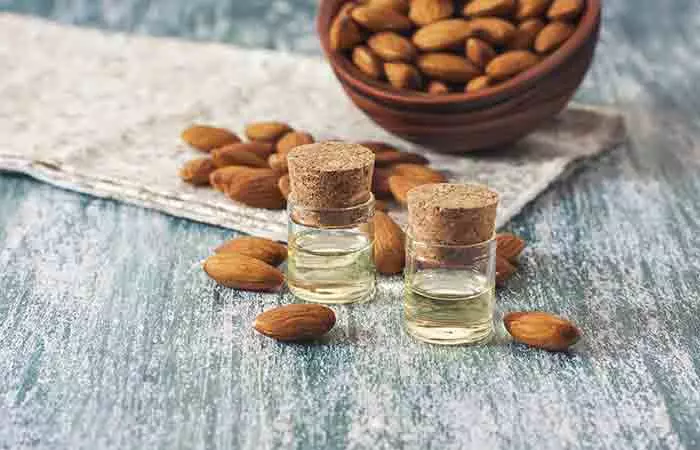
Sweet almond oil has sclerosanti Sclerosing agents like hypertonic saline or dextrose that are used to treat blood vessel malformations such as those seen in varicose veins. as well as emollient properties (1). It may help reduce the appearance of blood vessels underneath your skin by improving your skin tone.
What You Can Do: Dab 2-3 drops of sweet almond oil on a cotton ball. Apply it to the dark circles and massage into your skin. Leave it on overnight and wash off in the morning. Apply it every night before sleeping until the dark circles fade. However, when using almond oil for dark circles, ensure that you buy 100% pure and organic oil, without any additives.
2. Aloe Vera Gel
Aloe vera gel contains aloesin, a compound that inhibits tyrosinasei It is a copper containing enzyme present in plants and animals that catalyzes the formation of melanina and other pigments. activity (2). This can help in preventing excessive pigmentation on your skin. It can also hydrate the skin in the surrounding area and make it supple.
What You Can Do: Take a teaspoon of aloe vera gel and massage it into the affected area. Leave it on overnight and wash it off in the morning. You can follow this every night until the dark circles fade.
3. Cucumber
Cucumber contains bioactive compounds and vitamins that can inhibit tyrosinase activity (3). This can help reduce pigmentation around the eyes. Moreover, cucumbers are also considered an excellent sunken eyes remedy as they help reduce puffiness and swelling around the eyes.
What You Can Do: You will need one cucumber and a teaspoon of aloe vera gel. Blend the ingredients to make a thick paste. Apply this paste to the affected areas and leave it on for 15 minutes. Wash off with plain water. You can apply this paste once every day.
4. Tomato
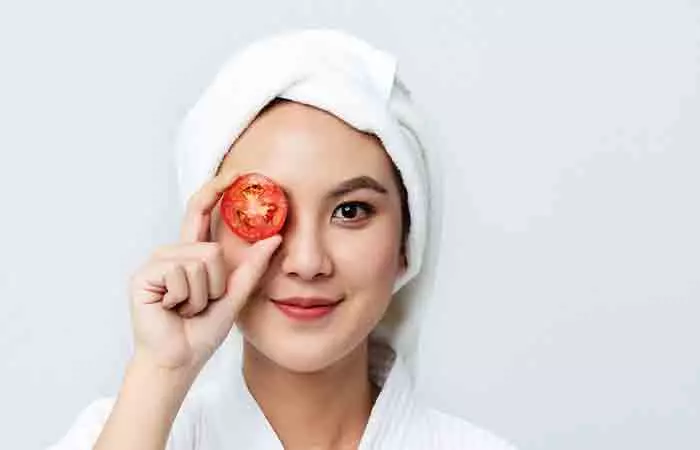
Tomatoes are rich in phytochemicals like lycopene and beta-carotene that mitigate oxidative damage to skin tissues and reduce erythema (redness) of skin (4), (5). This can help get rid of the dark circles that develop under the eyes.
What You Can Do: Make a paste by blending a tomato and lemon juice. Apply this around your eyes and leave it on for 20 minutes. Rinse it off thoroughly. Do this once or twice a week.
Note: Lemon juice can cause a stinging sensation on your skin, so you must do a patch test before trying this remedy.
5. Lemon Juice
Lemon is a rich source of vitamin C. Vitamin C exhibits anti-pigmentary properties and may help increase the dermal thickness under the eyes (6). This can help conceal the blood vessels that become visible due to the thinning of the skin and lighten dark circles.
What You Can Do: Extract the juice of fresh lemon. Dab a cotton ball in this juice and apply it to the dark circles. Leave it on for 15 minutes and wash off. Repeat this remedy twice a week for 3-4 weeks.
Note: Lemon juice can cause a stinging sensation on your skin, so do a patch test before trying this remedy. Also, make sure you apply sunscreen before stepping out in the sun as lemon juice can make your skin photosensitivei A condition in which the skin becomes very sensitive to UV rays present in sunlight, causing it to burn easily. .
6. Rosehip Oil
Rosehip oil contains proanthocyanidins that exhibit melanogenesisi The complex process by which melanocytes produce melanin that leads to skin pigmentation and protects the skin from UV rays. which is the production of melanin pigment of melanocytes that results in skin whitening.” ] properties (2). Hence, it may inhibit pigmentation in the skin around your eyes and reduce dark circles.
What You Can Do: Take a few drops of rosehip oil. Dilute it with coconut oil and apply it to the dark circles with a cotton pad. Leave it on overnight and wash it off from your skin in the morning. Repeat this remedy every night until the dark circles fade away.
7. Licorice Extract

Licorice extracts contain glabridin, which inhibits melanin synthesis (7). This effect can help in reducing the appearance of dark circles.
What You Can Do: Take a few drops of licorice extract and mix well with a vitamin K capsule until you get a smooth paste. Apply this paste on your dark circles and leave it on for 10 minutes. Wash it thoroughly. You can apply this paste thrice a week.
8. Yogurt
Yogurt contains L-cysteine that inhibits tyrosinase activity and prevents pigmentation and dark circles (8).
What You Can Do: Add a teaspoon of lemon juice to two teaspoons of yogurt. Mix well, apply this paste to the dark circles, and leave it on for 15-20 minutes. Wash it off. You can do this at least twice a week.
Note: Lemon can irritate some skin types. Make sure to carry out a patch test before trying out this remedy.
9. Potato
Potato juice contains azelaic acid that can inhibit tyrosinase activity to reduce pigmentation (9). This may help in fading dark circles.
What You Can Do: Extract about 1-2 tablespoons of potato juice in a bowl. Apply the juice on the dark circles and leave it on until it dries. Rinse off with water. Do this at least twice a week.
Monica Kalra, a blogger, shares her experience using a cucumber and potato extract mask to combat under-eye pigmentation in a short time. She notes, “I started using this eye mask daily before hitting the bed and I saw a major improvement in my undereye area within 15 days. Not only did the undereye area look brighter but also well-rested and less puffy (i).”
10. Saffron
Bioactive compounds, like carotenoids and riboflavin, promote the anti-tyrosinase activity of saffron (10). These compounds may help prevent excessive pigmentation of the skin and reduce the appearance of dark circles.
What You Can Do: Take 3-4 strands of saffron and soak them in a quarter cup of milk for about 2 hours. Strain the milk and apply it on the skin surrounding your eyes. You can wash it off in about 10 minutes.
11. Honey

Honey contains polyphenols that inhibit tyrosinase activity (11). This can help reduce excessive pigmentation and fade dark circles.
What You Can Do: Mix a teaspoon of lemon juice with a tablespoon of honey. Apply this mixture to the skin surrounding your eyes and leave for about 10-15 minutes. Rinse thoroughly with water. Repeat this once a day until the dark circles fade.
 Quick Tip
Quick Tip12. Green Tea Bags
Green tea contains phenolic compounds that inhibit melanogenesis (12). This may help prevent excessive pigmentation of the skin and reduce dark circles.
What You Can Do: Take two green tea bags and soak them in water. Refrigerate for a short while and place them on your eyes. Wash your face after 10-15 minutes. You can repeat daily until the dark circles fade away.
13. Grapeseed Oil
Grapeseed oil contains bioactive compounds that can inhibit melanogenesis (13). This may help reduce pigmentation and dark circles.
What You Can Do: Take 2-3 drops of grapeseed oil and gently massage it into the skin surrounding your lower eyelids. Leave it on overnight and wash off the next morning. You can repeat this every night for a few weeks.
Let us now discuss the factors that contribute to dark circles, so you can choose the most appropriate treatment and prevention strategies.
What Causes Dark Circles Under The Eyes?
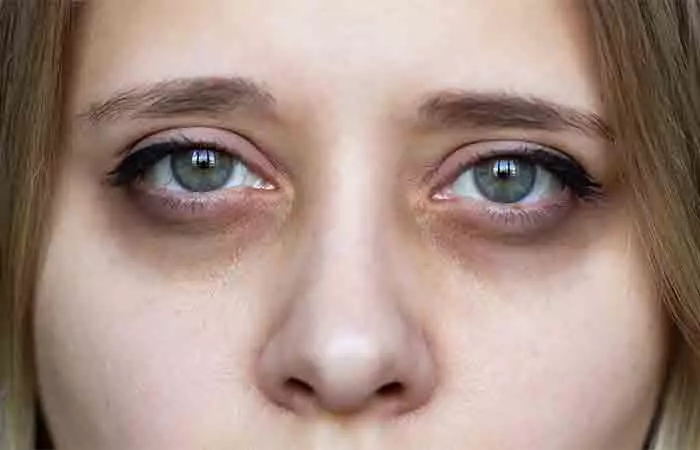
- Fatigue: Fatigue can occur as a consequence of sleep deprivation, physical and mental exertion, or even oversleeping. All of these can cause dark circles under your eyes. Deprivation of sleep can cause your eyes to look puffy and make the skin look pale over time. This can make the dark circles more apparent. Dark circles may be shadows of puffy eyelids.
- Age: In most cases, as you become older, dark circles appear as a result of excessive pigmentation. When you grow old, the skin around your eyes can become thinner and lose collagen. This, in turn, increases the visibility of the dark blood vessels underneath your skin.
- Straining Your Eyes: Strain to your eyes due to excessive use of computers, phones, television, etc. can lead to an enlargement in the blood vessels around your eyes, thereby causing dark circles.
- Anemia: This condition may contribute to the development of dark circles. Since hemoglobin carries oxygen, anemia can reduce the oxygen flow to the skin, making the skin around the eyes appear darker (14), (15). Research also suggests that dark circles due to anemia have a greater prevalence rate in women (16).
- Sun Overexposure: Exposing your skin to harmful UV rays may lead to increased pigmentation, making the under-eye area appear darker (17). Sun exposure can also cause the under eye skin to become dry and wrinkled, which may make them appear darker.
 Quick Tip
Quick Tip- Allergies: An allergic reaction to harmful bacteria makes your body release histamines that can lead to the dilation of blood vessels. This increases their visibility on your skin, making the area around your eyes look darker than usual.
- Dehydration: Inadequate hydration can make your skin look pale and dull. Your eyes can have a sunken appearance, making the skin in the surrounding area look darker.
- Exposure To The Sun: Your skin can overproduce melanin on exposure to the sun for long periods. This may lead to pigmentation in the skin around your eyes.
- History Of Dark Circles: A family history of dark circles might indicate that you can also have them later in life. Underlying conditions, such as thyroid disease, can also cause dark circles.
Symptoms Of Dark Circles
- Gradual appearance of a dark patch under your eyes
- Tiredness arising from sleeplessness
- Stress and weakness
- The area under the lower eyelid looks puffy, and eye bags begin to form.
- Cyanosis: Sometimes, your body is incapable of transporting oxygen-rich blood to various parts of your body. This can result in a bluish tint being imparted to your skin. It can be observed in the mucous membranes, lips, around the eyes, and nails.
Understanding the reason behind the dark circles can help you determine the treatment. Besides trying these remedies at home, you can also seek medical treatments to reduce their appearance.
Medical Treatment Options For Dark Circles
- Chemical Peels: Chemical peels can help eliminate dark circles by modulating the melanin content in the skin surface (18).
- Laser Therapy: Laser therapy can help lighten dark circles by targeting the pigmentation around your eyes and also promoting collagen formation (19).
- Blepharopigmentation: The pigment is injected into the areas where the skin is thinning or pigmented (20). This procedure might lead to complications like pigmentation and resultant inflammation in the area around the surgical area.
You may want to also consult a dermatologist apart from trying these treatments. They can give you specific advice tailored to your skin type and issues and share the newest skincare technology that may help lighten dark circles.
These methods are invasive and need medical intervention. You must also keep in mind that you will require ample time for recovery from these procedures.
When To See A Doctor
Typically, dark circles occur due to stress or insomniai A sleep disorder that makes it difficult to fall or stay asleep for a period normally required by the body to properly function. . They can vanish over time if you rectify your lifestyle and get adequate rest. However, if the dark circles do not go away with time or if there is swelling under one eye, you must get it checked by your doctor.
If you still have dark circles even after changing your lifestyle, you should consult a dermatologist. Additionally, if you notice other issues along with dark circles like sunken eyes or swelling and tenderness, please visit a doctor immediately. These symptoms may indicate an underlying medical issue like thyroid hormone imbalance or allergies.
Once you reduce those dark circles, you probably want to ensure that you never get them again. Keep reading to learn how you can prevent dark circles from occurring.
Prevention Tips For Dark Circles
- Get adequate rest if you indulge in high-intensity workouts or activity.
- Ensure that you get at least 7 hours of sleep every day.
- Staying hydrated can ensure that your skin retains the moisture it needs, which keeps it supple.
- Wear sunglasses to protect your eyes from UV rays.
- Avoid staring at your phone or any screen for too long, especially at night.
- Supplementing your diet with nutritionally rich foods can increase collagen synthesis and repair the skin around your eyes and also eliminate pigmentation.
Infographic: 6 Home Remedies To Fade Dark Circles
Dark circles are often a common consequence of a stressful lifestyle, poor diet, smoking, alcohol consumption, and even lack of exercise. However, a little extra sleep, proper nutrition along with some skin care can easily restore health to the skin under your eyes. Check out the infographic below for 6 simple home remedies that can help fade dark circles in no time.
Some thing wrong with infographic shortcode. please verify shortcode syntax
Home remedies can be a great way to reduce the appearance dark circles and brighten your eyes. By using natural ingredients like almond oil, aloe vera gel, cucumber, tomatoes, and even licorice extract, you can nourish and revitalize the delicate skin around your eyes. These remedies not only help to lighten dark circles but also hydrate and nourish your skin to improve its health. While medical treatments are available, these natural solutions offer a gentle and effective way to tackle dark circles at home. However, you need to properly follow the remedies correctly as the wrong combination of ingredients, or the wrong proportions may be ineffective or do more harm than good.
Frequently Asked Questions
Are dark circles permanent?
Dark circles are not permanent. You can choose from a variety of medical and natural methods to get rid of them.
Does sleep help reduce dark circles?
Sleep can help if you feel tired and reduces fatigue. This, in turn, reduces the appearance of dark circles and puffiness around the eyes.
Which vitamins should you take to eliminate dark circles?
Vitamin K can help get rid of dark circles as it can help with blood circulation and coagulation. Vitamin A can also help as it can get rid of pigmentation.
What foods can you eat to eliminate dark circles?
Consumption of foods like green leafy vegetables, broccoli, Brussels sprouts, etc. can help eliminate dark circles as they are rich in vitamin K.
Can steam remove dark circles?
Yes. Put a towel over your head to contain the steam around your eyes. This natural method can reduce the appearance of dark circles and rejuvenate the skin around your eyes.
Are dark circles hormonal?
Yes, hormonal changes can also cause dark circles and puffy eyes. When stressed, your body produces more cortisol (the stress hormone) (21). You experience restlessness and sleep disturbances, which can lead to chronic fatigue and eventually, dark circles.
Does caffeine help dark circles?
Caffeine is known to reduce dark circles by improving blood circulation and tightening the blood vessels. It even has the capacity to enter the lower eyelids and reduce the existing pigmentation and oedema (22).
Is hot or cold better for dark circles?
A cold compress is better. It can help reduce the swelling and constrict the dilated blood vessels, which can lessen the puffiness and lighten the under-eye dark circles. Put a few ice cubes in a clean cloth and apply it to your eyes for 20 minutes.
Key Takeaways
- Aging, fatigue, excessive strain, and dehydration are a few causes of dark circles under your eyes.
- Common symptoms include eye bags and darkness around the eyes.
- Natural ingredients like sweet almond oil, grapeseed oil, green tea bags, honey, or cucumber slices help in reducing dark circles.
- Medical treatments like chemical peels and laser therapy help reduce melanin production around the eyes.
- Ensure that you get 7 hours of sleep every day to prevent dark circles under the eyes.
Illustration: Natural Ways To Treat Dark Circles Under The Eyes At Home
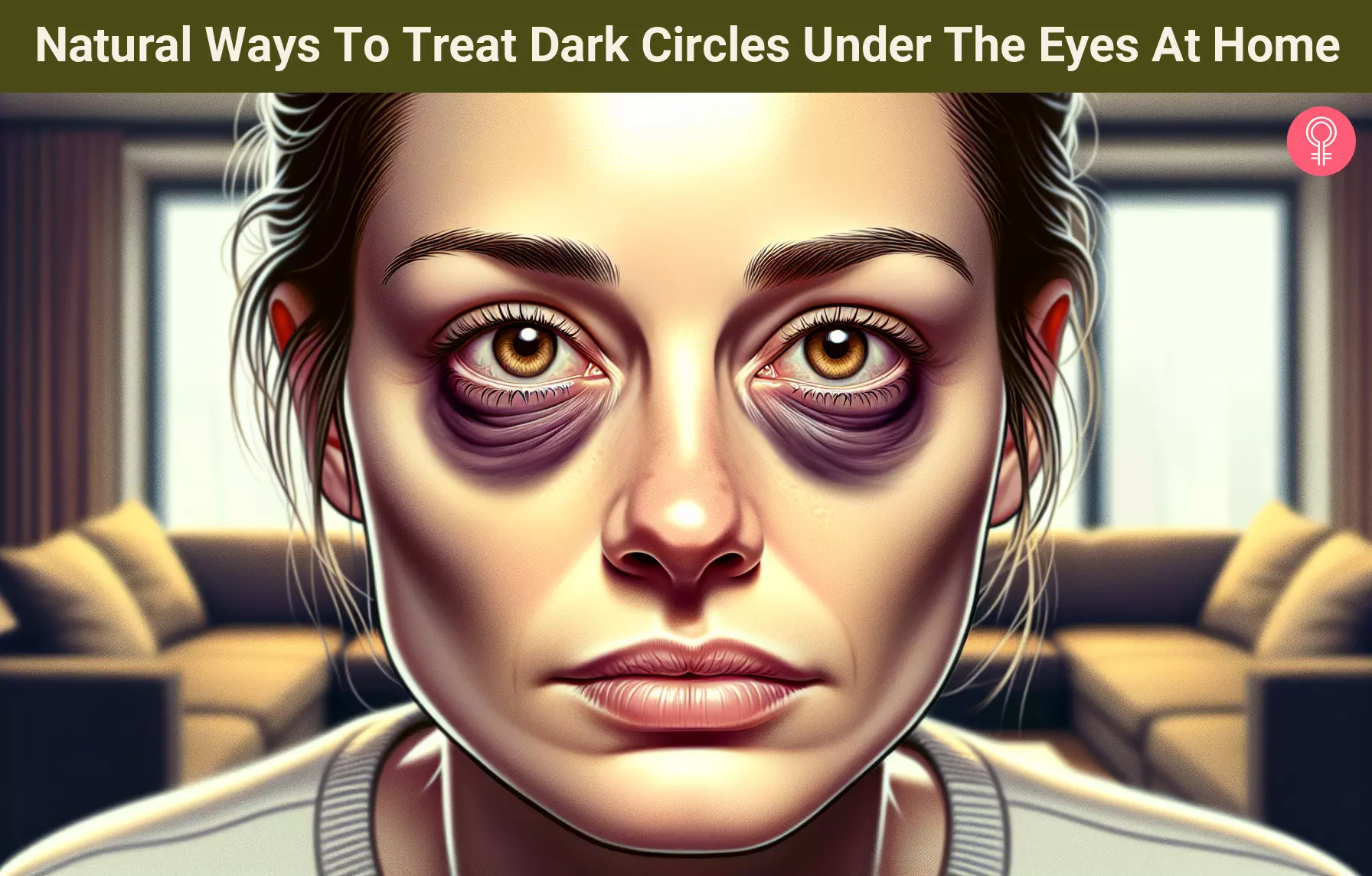
Image: Dall·E/StyleCraze Design Team
Experience the magic of a coffee eye mask and gel in removing dark circles, under-eye wrinkles, and eye bags. Say goodbye to tired-looking eyes and embrace a rejuvenated and refreshed appearance. Watch now!
Personal Experience: Source
StyleCraze's articles are interwoven with authentic personal narratives that provide depth and resonance to our content. Below are the sources of the personal accounts referenced in this article.
i. Wise Wednesday: DIY Eye Pack for Dark Circleshttps://glamourzglitz.wordpress.com/2015/09/16/wise-wednesday-diy-eye-pack-for-dark-circles/
References
Articles on StyleCraze are backed by verified information from peer-reviewed and academic research papers, reputed organizations, research institutions, and medical associations to ensure accuracy and relevance. Read our editorial policy to learn more.
- Anti-Inflammatory and Skin Barrier Repair Effects of Topical Application of Some Plant Oils, MDPI, US National Library of Medicine, National Institutes of Health.
https://www.ncbi.nlm.nih.gov/pmc/articles/PMC5796020/ - Skin Ageing: Natural Weapons and Strategies, Evidence-Based Complementary and Alternative Medicine, US National Library of Medicine, National Institutes of Health.
https://www.ncbi.nlm.nih.gov/pmc/articles/PMC3569896/ - Exploring cucumber extract for skin rejuvenation, African Journal of Biotechnology.
https://academicjournals.org/article/article1380726732_Akhtar%2520et%2520al.pdf - Discovering the link between nutrition and skin aging, DermatoEndocrinology, US National Library of Medicine, National Institutes of Health.
https://www.ncbi.nlm.nih.gov/pmc/articles/PMC3583891/ - Enhancing the Health-Promoting Effects of Tomato Fruit for Biofortified Food, Mediators of Inflammation, US National Library of Medicine, National Institutes of Health.
https://www.ncbi.nlm.nih.gov/pmc/articles/PMC3972926/ - Effects of vitamin C on dark circles of the lower eyelids: quantitative evaluation using image analysis and echogram. Skin Research and Technology, US National Library of Medicine, National Institutes of Health.
https://pubmed.ncbi.nlm.nih.gov/19626722/ - The inhibitory effect of glabridin from licorice extracts on melanogenesis and inflammation.Pigment Cell Research, US National Library of Medicine, National Institutes of Health.
https://pubmed.ncbi.nlm.nih.gov/9870547/ - Systemic skin whitening/lightening agents: What is the evidence? Indian Journal of Dermatology, Venerology, and Leprology.
https://ijdvl.com/systemic-skin-whitening-lightening-agents-what-is-the-evidence/ - Health Benefits and Cons of Solanum tuberosum, Journal of Medicinal Plants Studies.
https://www.plantsjournal.com/vol1Issue1/Issue_jan_2013/3.pdf - A critical review of Ayurvedic Varṇya herbs and their tyrosinase inhibition effect, Ancient Science of Life, US National Library of Medicine, National Institutes of Health.
https://www.ncbi.nlm.nih.gov/pmc/articles/PMC4623628/ - Sardinian honey as sources of xanthine oxidase and tyrosinase inhibitors, Food Science and Technology, US National Library of Medicine, National Institutes of Health.
https://www.ncbi.nlm.nih.gov/pmc/articles/PMC6049736/ - Inhibition of tyrosinase by green tea components. Life Sciences, US National Library of Medicine, National Institutes of Health.
https://pubmed.ncbi.nlm.nih.gov/10576599/ - Oligomeric proanthocyanidins from grape seeds effectively inhibit ultraviolet-induced melanogenesis of human melanocytes in vitro. International Journal of Molecular Medicine, US National Library of Medicine, National Institutes of Health.
https://pubmed.ncbi.nlm.nih.gov/19148543/ - Physiological and lifestyle factors contributing to risk and severity of peri-orbital dark circles in the Brazilian population Anais Brasileiros de Dermatologia | Journal US National Library of Medicine National Institutes of Health.
https://www.ncbi.nlm.nih.gov/pmc/articles/PMC4560538/ - Study of Causative Factors and Clinical Patterns of Periorbital Pigmentation Indian Dermatology Online Journal US National Library of Medicine National Institutes of Health.
https://www.ncbi.nlm.nih.gov/pmc/articles/PMC6536080/ - Periocular Dark Circles: Correlates of Severity Annals of Dermatology US National Library of Medicine National Institutes of Health.
https://www.ncbi.nlm.nih.gov/pmc/articles/PMC8460477/ - Periorbital Hyperpigmentation—Dark Circles under the Eyes; Treatment Suggestions and Combining Procedures Cosmetics MDPI.
https://www.mdpi.com/2079-9284/8/2/26 - Chemical peeling with trichloroacetic acid and lactic acid for infraorbital dark circles. Journal of Cosmetic Dermatology, US National Library of Medicine, National Institutes of Health.
https://pubmed.ncbi.nlm.nih.gov/23992162/ - Infraorbital Dark Circles: A Review of the Pathogenesis, Evaluation, and Treatment, Journal of Cutaneous and Aesthetic Surgery, US National Library of Medicine, National Institutes of Health.
https://www.ncbi.nlm.nih.gov/pmc/articles/PMC4924417/ - Inadvertent pigmentation of the limbus during cosmetic blepharopigmentation. Cornea, US National Library of Medicine, National Institutes of Health.
https://pubmed.ncbi.nlm.nih.gov/19512894/ - Stress and hormones
https://www.ncbi.nlm.nih.gov/pmc/articles/PMC3079864/ - Infraorbital Dark Circles: A Review of the Pathogenesis, Evaluation and Treatment
https://www.ncbi.nlm.nih.gov/pmc/articles/PMC4924417/
Read full bio of Vd. Naveen Sharma
Read full bio of Shaheen Naser
Read full bio of Anjali Sayee
Read full bio of Swathi E





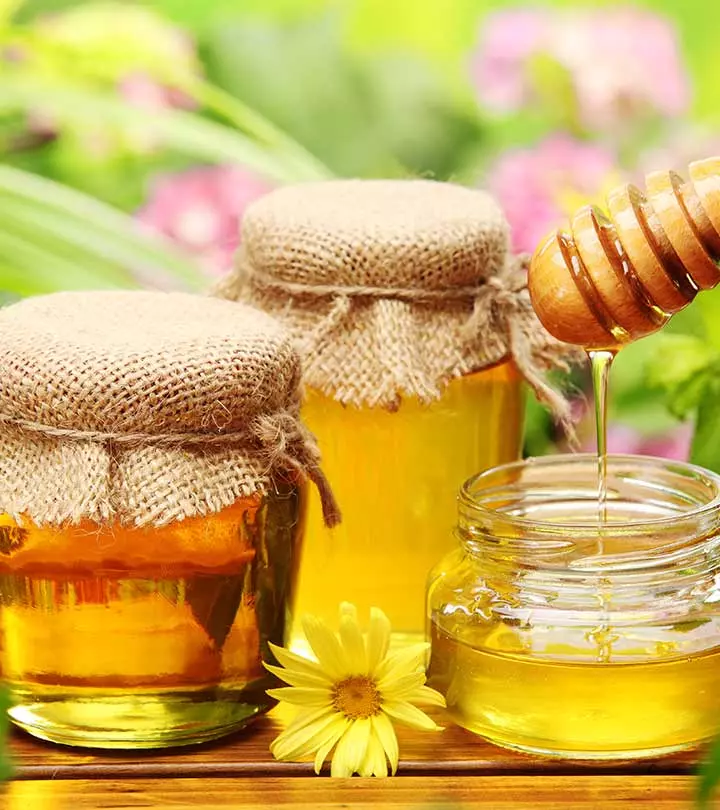

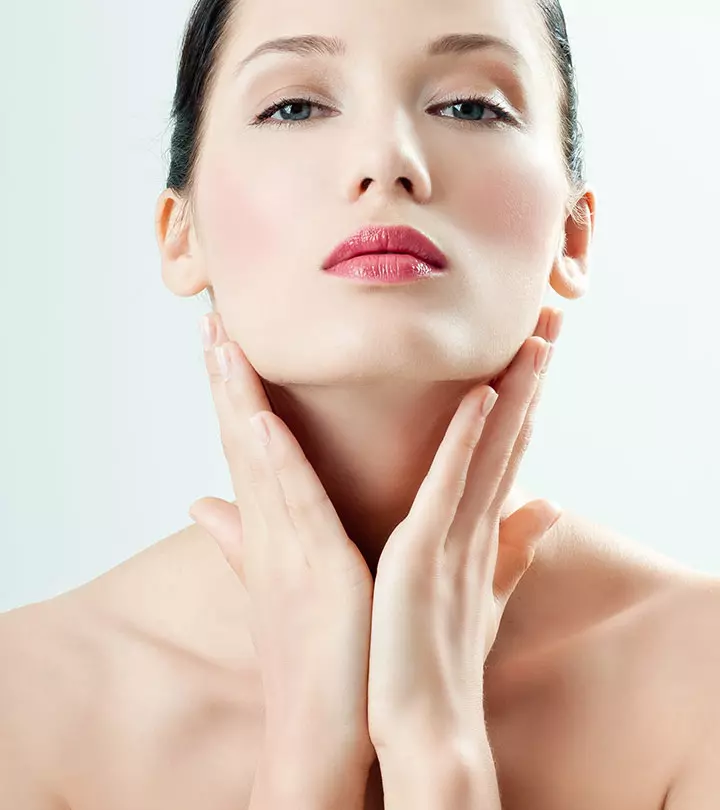

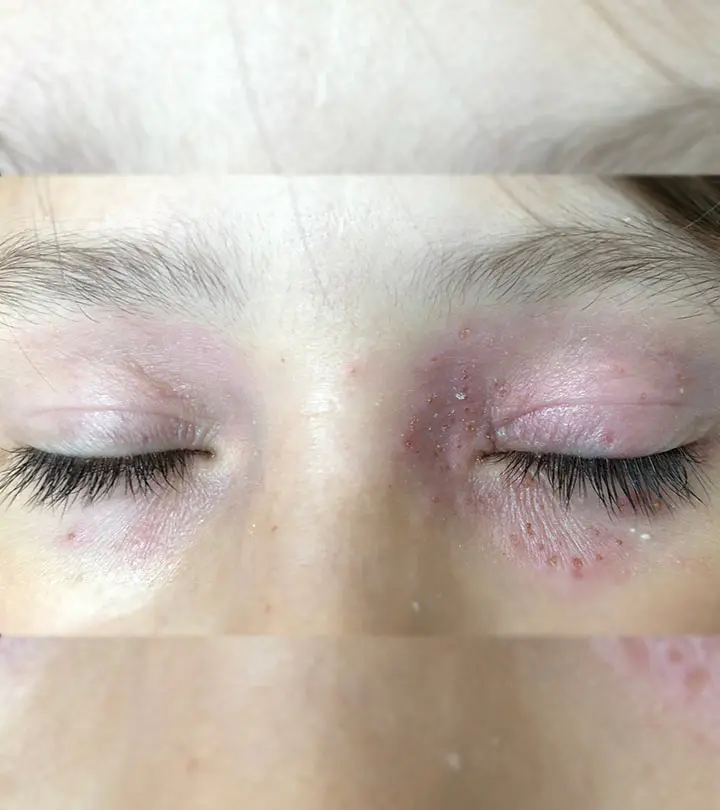

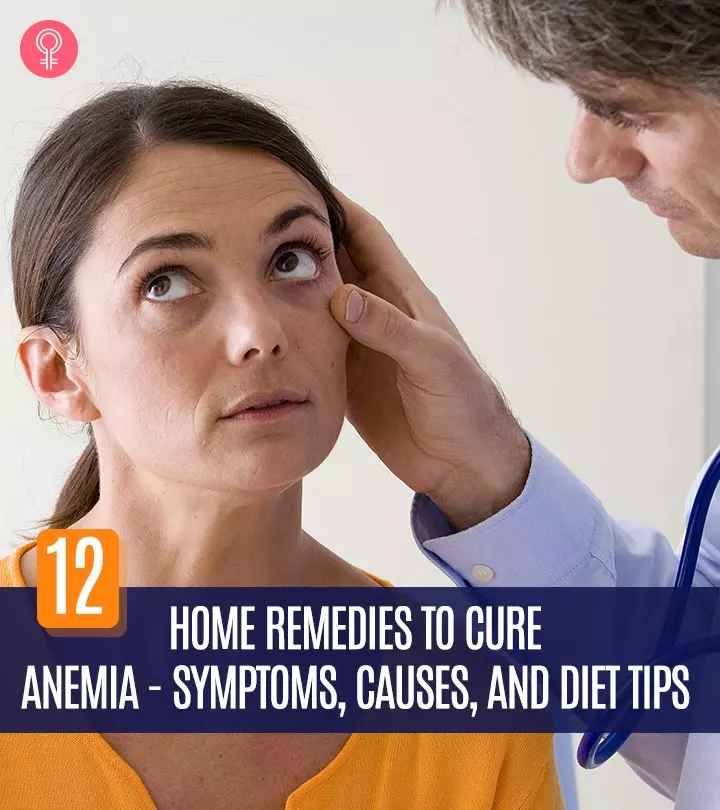
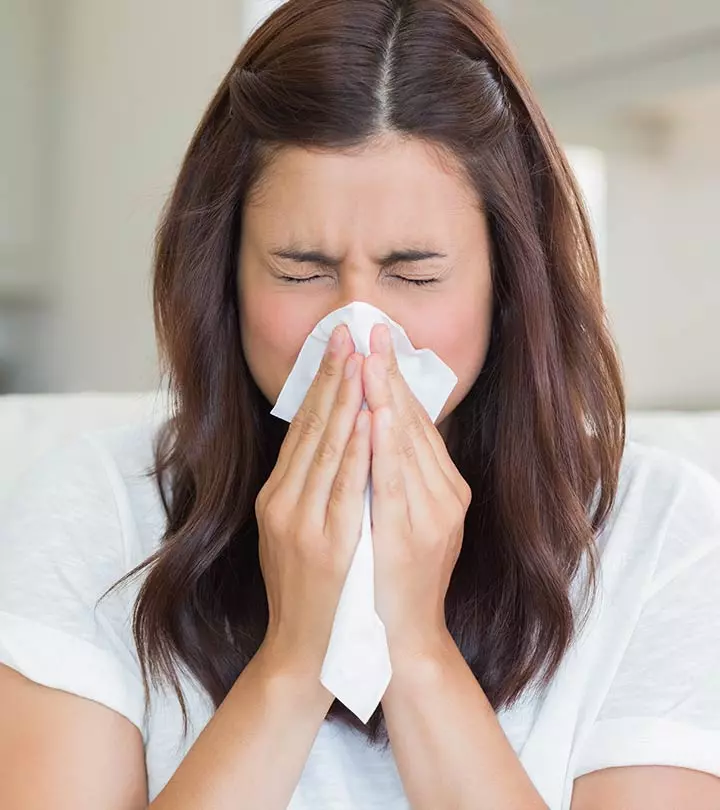
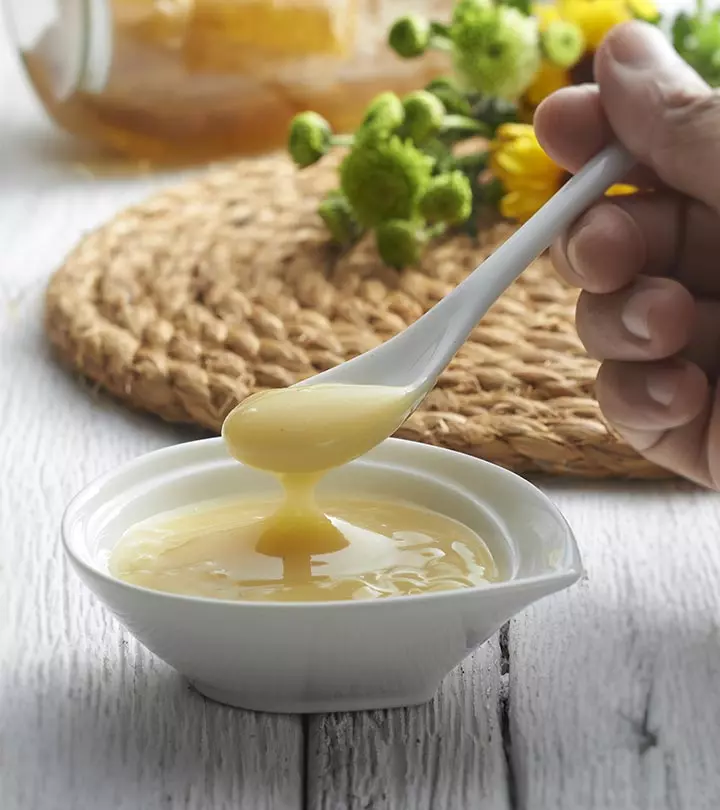

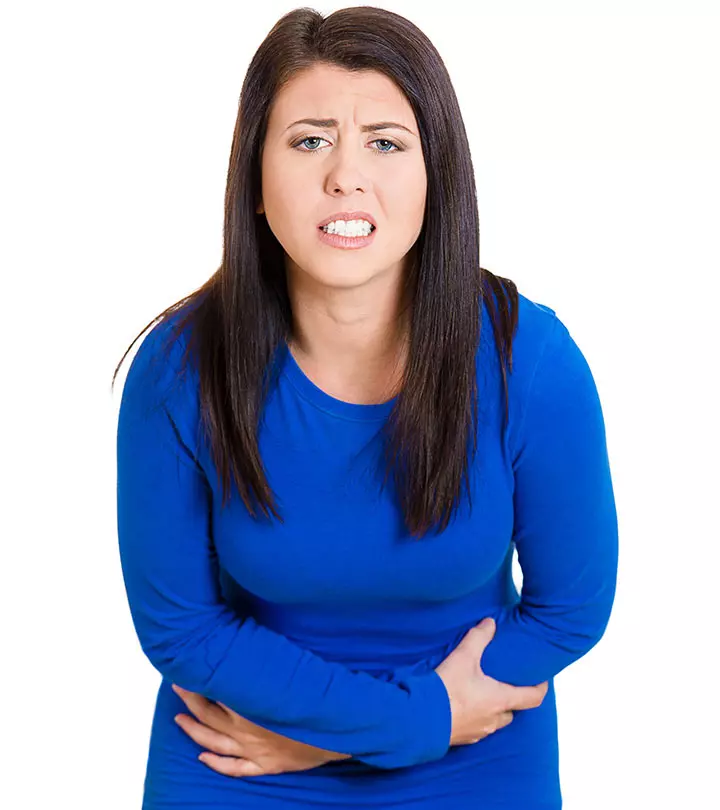
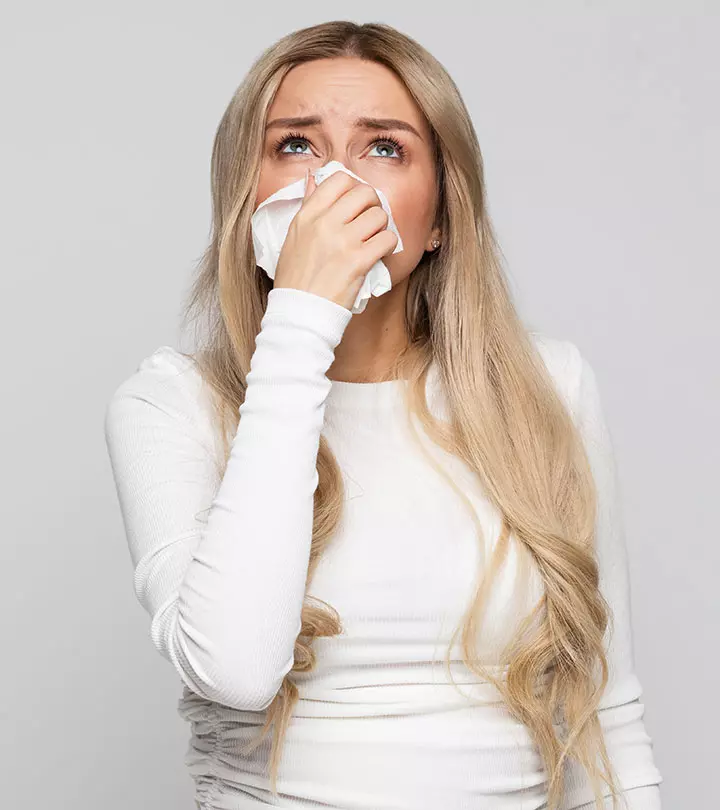


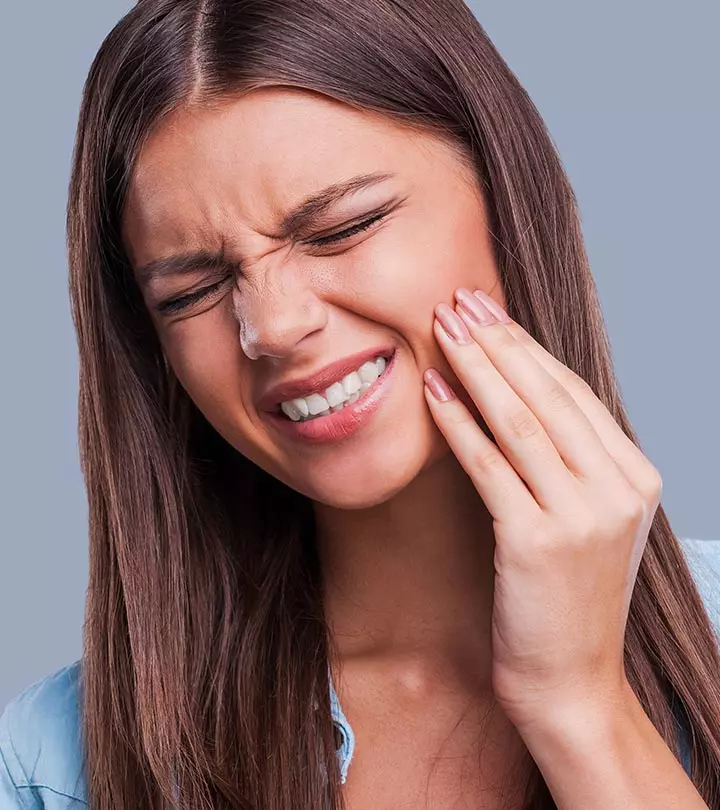
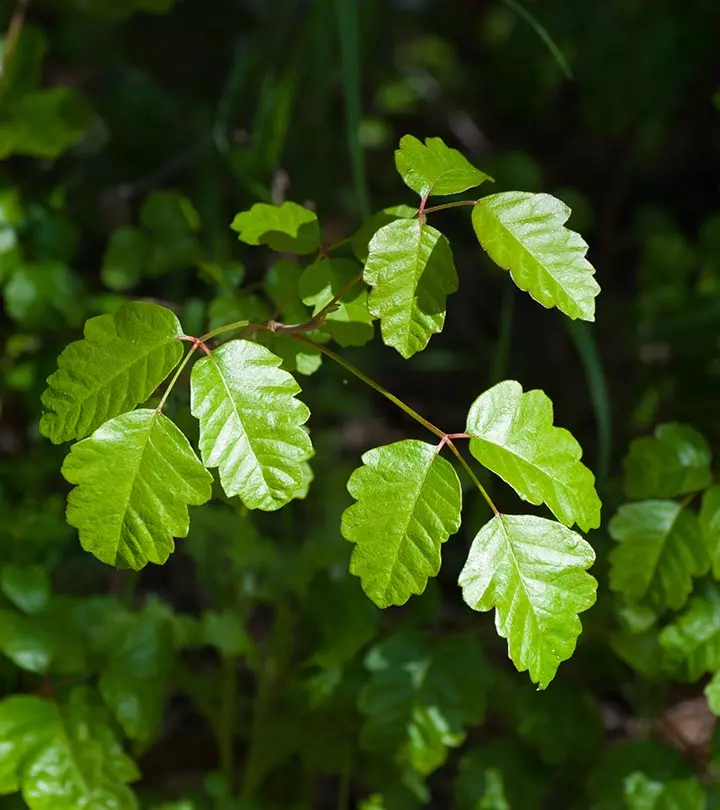



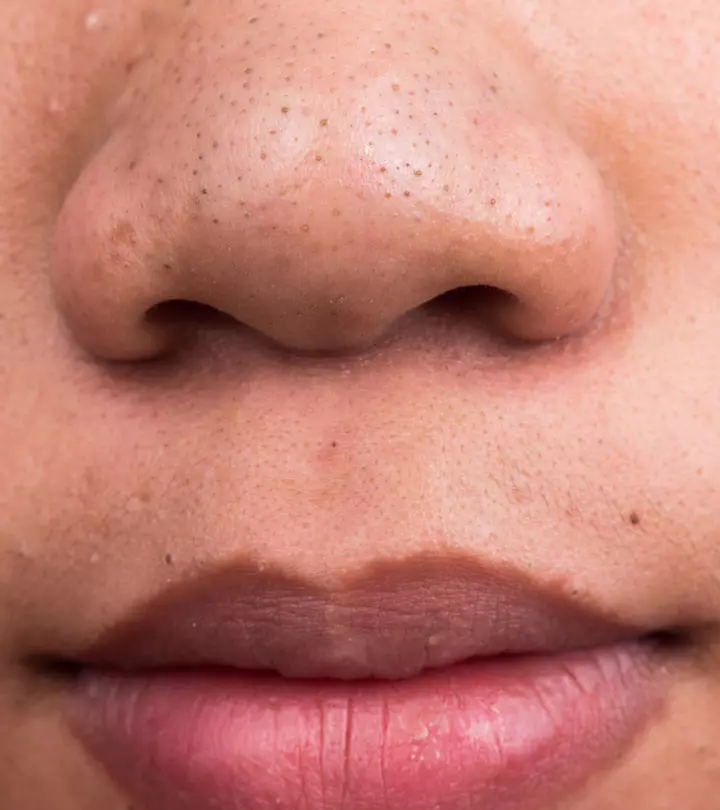

Community Experiences
Join the conversation and become a part of our empowering community! Share your stories, experiences, and insights to connect with other beauty, lifestyle, and health enthusiasts.